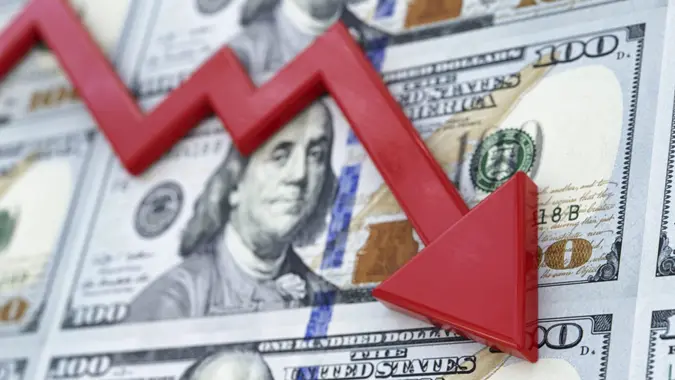This Could Signal a Recession Is Coming, According to One Economist — What You Need To Know

Commitment to Our Readers
GOBankingRates' editorial team is committed to bringing you unbiased reviews and information. We use data-driven methodologies to evaluate financial products and services - our reviews and ratings are not influenced by advertisers. You can read more about our editorial guidelines and our products and services review methodology.

20 Years
Helping You Live Richer

Reviewed
by Experts

Trusted by
Millions of Readers
Whispers of a looming recession are growing louder as economists weigh the impact of tariffs proposed by President Donald Trump. Much of the worry has to do with how a trade war could impact consumer prices and spending, but another factor could be an important sign as well.
Mark Zandi, chief economist at Moody’s Analytics, addressed the topic of mortgage delinquencies in a recent X post. In the post, dated March 24, Zandi called the Federal Housing Administration (FHA) mortgage delinquency rate “leading indicator #2” on his recession watch.
Read on for more details about this indicator of recession.
Keep an Eye on Mortgage Delinquencies
“This isn’t typically in lists of leading economic indicators, but it may be a proverbial canary in the coal mine in the current context,” Zandi wrote. “FHA borrowers have low to moderate incomes, with a median income of about $75,000 a year, and most are first-time homebuyers. Judging from the recent increase in the delinquency rate on FHA loans, these households are under mounting financial stress.”
That’s the case even though the U.S. has an “exceptionally low” 4% unemployment rate, Zandi added — a sign that some borrowers have low credit scores, made low down payments and have high debt-to-income ratios.
Because of high mortgage rates and home prices, many borrowers have to “shell out a big share of their income” toward mortgage payments, according to Zandi. He explained that those who gambled that mortgage rates would ease, meaning they could refinance, now face the possibility that rates will remain high for the foreseeable future.
Mortgage delinquencies alone won’t lead to a recession, Zandi explained. But if the job market begins to “wobble” and the economy weakens, “it is FHA borrowers who will signal [a recession] first.”
What Is the Delinquency Rate Now?
In a February report, the Mortgage Bankers Association (MBA) noted that the delinquency rate for mortgage loans on one-to-four-unit residential properties went up in the fourth quarter of 2024. The seasonally adjusted delinquency rate was 3.98% of all loans outstanding. Compared with the third quarter of 2024, that’s an increase of 6 basis points. And year over year, it’s a 10-basis-point increase.
In a press release, Marina Walsh, vice president of industry analysis at MBA, said FHA and Veterans Affairs (VA) delinquencies are growing more quickly than conventional mortgage delinquencies.
“Government loans are also rolling to later stages of delinquency,” Walsh explained. “Compared to one year ago, the seriously delinquent rate rose seventy basis points for FHA loans and fifty-seven basis points for VA loans, but only two basis points for conventional loans.”
Mortgage delinquencies can be a good indicator of recession because they tend to go way up during times of economic distress. This last happened during the early days of the COVID-19 pandemic. According to Statista, the mortgage delinquency rate surpassed 8% during the pandemic.
More From GOBankingRates
 Written by
Written by  Edited by
Edited by 

























